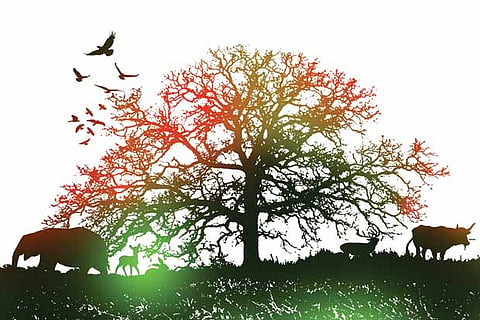

Chennai
Tamil Nadu continues to lag behind in management of biodiversity, with the formation of biodiversity management committees (BMCs) failing to gain steam since the Biological Diversity Act 2002 came into force about a decade ago, leading to the exploitation of natural resources without any thought for conservation.
Till date, the state has only 19 BMCs, which makes it an uphill task of setting up BMCs at every village, block level and district level, as mandated by the Biological Diversity Act.
Statistics from National Biodiversity Authority (NBA) reveal that Kerala has 1,043 panels of BMC whereas Karnataka has 4,363 and Andhra Pradesh, 928. Even the recently carved out state of Telengana has set up 710 BMCs. Karnataka has even declared four biodiversity heritage sites.
As per the guidelines issued under the Act, the process of BMC formation would involve all the stakeholders in the gram sabha including tribals and other marginalised communities to ensure an effective consultative process .
“The absence of BMCs deprives the local communities of their rightful share enshrined under the Act, and accords undue privileges to private players, who exploit the resources without any accountability. The very idea of BMC is to create access and benefit sharing in the local community. The Act also mandates that only the elected local body can form the BMCs. Also, in Tamil Nadu, election to the civic bodies which completed their term last year have not been held due to various reasons, including litigation and the implementation of reservation for women members in civic bodies”, a source from NBA observed.
“Under the Act, BMCs would have to prepare People’s Biodiversity Register (PBR) besides participating and ensuring conservation and sustainable utilisation of biological resources. BMCs would be entrusted with the management of heritage sites including heritage trees, animals/micro-organisms etc., and the ‘sacred groves’ and ‘sacred water bodies’, besides regulation of access to the biological resources associated with traditional knowledge, for commercial and research purposes”, the official said.
The official also pointed out that any further delay in formation of the BMCs would only endanger the biodiversity in the state. The conservation of biodiversity is on a par with Sikkim which has only 13 panels of BMCs and Nagaland which has 10. Madhya Pradesh tops the chart with the formation of as many as 23,743 units of BMCs.
When asked about the inordinate delay in the formation of the BMCs, Forest Minister Dindigul C Sreenivasan said that they were already seized of the matter, and are taking adequate measures to increase the number of BMCs in the state. “It has to be formed in every local body, and it will be formed. We could not do it due to the delay in the election to the local bodies. We reviewed the development in this regard last month”, he said. “Three more BMCs have been formed since the review meeting held last month. We have instructed the District Collectors to give thrust to form BMCs. Once the elections to the local bodies are complete, we would further expedite the process of forming BMCs to benefit the local populace,” he added.
GOOD EARTH
Rich role
BMCs promote conservation, sustainable use and documentation of biological diversity, including preservation of habitats, conservation of landraces, folk varieties and cultivars, domesticated stock and breeds of animals and micro-organisms and chronicling of knowledge relating to biological diversity
Meetings
BMC shall hold a minimum of 4 meetings in a year, and meet once at least in every 3 months. The meetings shall be chaired by the Chairperson of the BMC, and in his/her absence, by any other member elected by the members present. The quorum at every meeting shall be three including the chairperson and excluding official members.
Funds
Village-level BMC would get a star-tup fund of Rs 60,000, while the block-level BMC would get Rs 80,000 and district-level unit would receive Rs 1,00,000. The funds earmarked would be spent for opening of bank account, purchase of office equipment including stationary, meetings, and formation of BMC
Responsibility
To prepare, maintain and validate People’s Biodiversity Register (PBR) in consultation with the local people. It should give information about the details of biological resources and traditional knowledge. Advice on any matter referred to it by the Biodiversity Board or Authority for granting approval, to maintain data about local vaids using biological resources
Loss makers
Reality check
Report card on status of BMCs in various states. Tamil Nadu has a meagre 19
Andhra Pradesh928
Arunachal Pradesh 43
Assam 171
Bihar—
Chatttisgarh27
Goa54
Gujarat:3405
Himachal Pradesh 155
Haryana—
Jharkhand66
Jammu & Kashmir —
Karnataka4,636
Kerala1,043
Madhya Pradesh23,743
Maharashtra890
Manipur52
Meghalaya94
Mizoram221
Nagaland10
Odisha230
Rajasthan31
Punjab55
Sikkim13
Tamil Nadu19
Telangana710
Tripura217
Uttar Pradesh32
Uttarkhand751
West Bengal176
Total 37,769
Visit news.dtnext.in to explore our interactive epaper!
Download the DT Next app for more exciting features!
Click here for iOS
Click here for Android